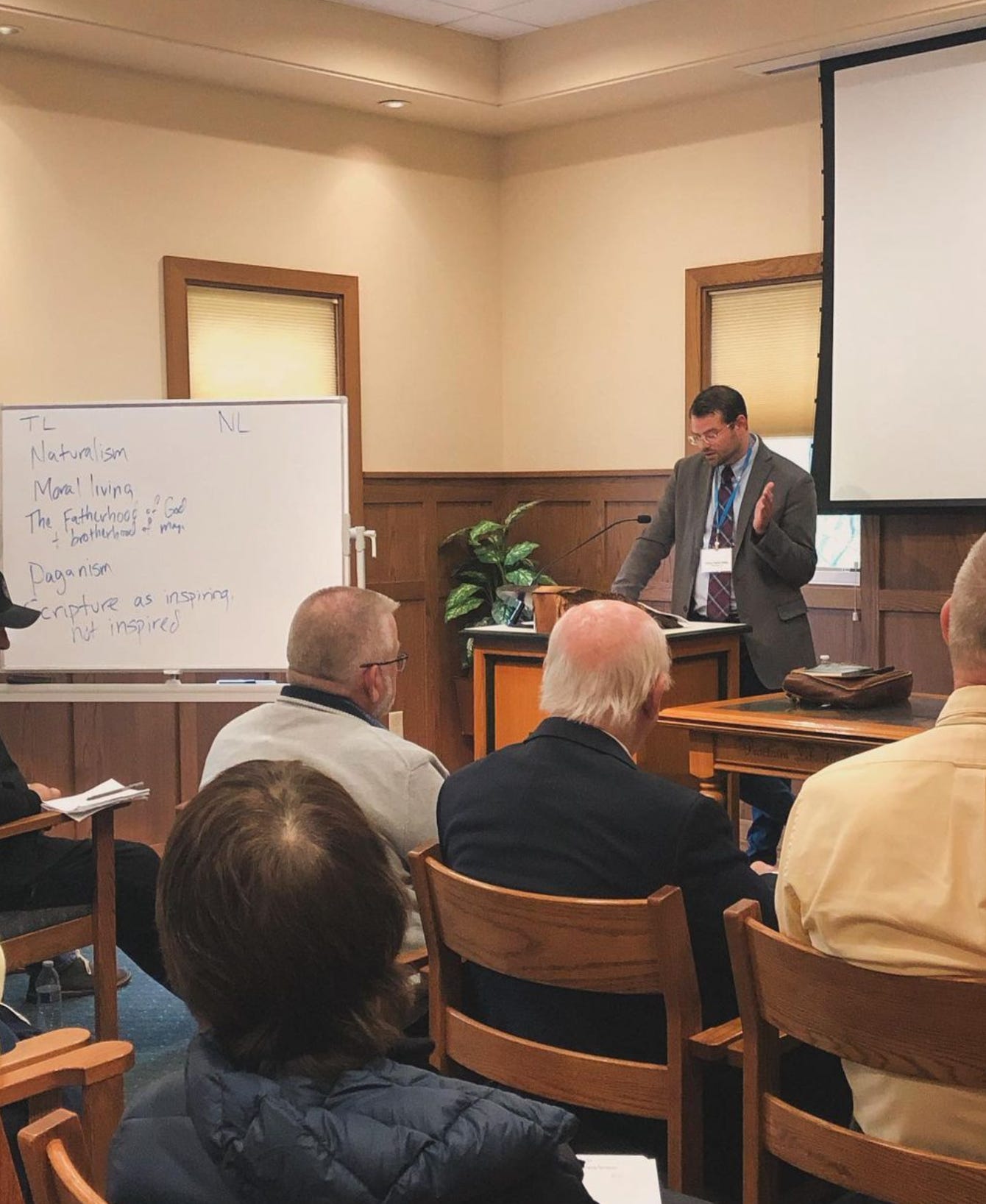What Biblical Meditation Looks Like
Some news, two book reviews, and a guide to biblical meditation
News
Lots of fun news to share with you this week! First, I went to my first conference—Philadelphia Conference on Reformed Theology—as a speaker and had a blast talking about J. Gresham Machen, Christianity & Liberalism, and our current cultural milieu. My talk was titled, “The New Liberalism: Machen in the 21st Century.” Maybe you’ll see it in print some day ;)
Second, I learned that One with God earned second place in the Christian Indie Awards (“Indie” is short for “Independent”), in addition to winning bronze in the Illumination Book Awards! This may not be a big deal to most people, and bringing it up seems awkward and self-aggrandizing. But, as an independent writer/publisher, I’ve learned that book awards are one of the few ways we can distinguish our work from that of so many other writers. So, I’m hoping it gets the book into the hands of a few more readers. That’s really what matters to me: that I get the privilege of serving more readers. You can be praying for that.
Book Reviews
I have two book reviews for you this week. The first is a book that’s been getting a lot of attention in more popular circles: John Mark Comer’s Practicing the Way. The second is a book that should be getting a whole lot attention, if I had my way: Vern Poythress’s Making Sense of the World. Both reviews have a synopsis/summary, my favorite quotes, and some other helpful info.
A Guide to Biblical Meditation
Since Comer’s book deals with the concept of meditation in the presence of Christ, I thought I would offer something I developed in One with God: Edmund Clowney’s guide to biblical meditation, i.e., meditation that is guided and directed by Scripture (as it should be). I call this a speechpath.
Edmund Clowney wrote a classic on Christian spirituality: Christian Meditation: What the Bible Teaches about Meditation and Spiritual Exercises. He answers a critical question there: what does Christian meditation do? Put simply, it “reflects on the truth of God in the presence of God.”
This reflection on God’s truth isn’t cold fact memorization. It glows like embers of love. Knowing God is loving him; “knowing God and loving God are acts of communion.” That’s what we’re after. That’s what we’re born for: communion with God, oneness. As our knowledge of God deepens, our love is meant to deepen. If it’s not deepening, something is off. Knowledge that doesn’t lead to deeper love is worthless. Think on that for a moment.
This is where our speechpath begins, with the speech of God in Scripture. When we soak in that speech, we’re drawn to deeper love. But this isn’t a matter of human effort. It’s the Spirit of God working in us. God takes the initiative in the blooming peony of oneness—making us so full and heavy that we must bow down. That’s what he’s done in loving us. His filling makes us fall in worship. But he came down to fill us up with his love. “Love is not the upward ascent of our souls that sublimates us into union with the deity. Rather, love is the descent of God’s royal grace that conquers our rebellion, atones for our guilt, and draws us into sonship.”
Love meets us on the ground to draw us up. It doesn’t demand that we rise up in worthiness. In fact, the very heart of God is to draw near with gentleness to those who are broken. This is God. This is love. This is Jesus meek and mild.
Love comes down to help us start walking on our speechpath, our communion trail with the Trinity. The first step on the speechpath is thus meditating on God’s words.
What does that meditation look like? Clowney writes that the three distinctives of Christian meditation are that it’s “centered on the truth of God, moved by the love of God, and directed to the praise of God.”
Let’s break these down with an example.
Centered on the Truth
To center is to focus. And focus can be achieved in all sorts of ways. Here are three.
Repetition
Slow, thoughtful reading
Prayerful consideration of meaning
Let’s center on Acts 3:1–10. Read it slowly. But before you read, pray this prayer: “God, open my eyes to the wild brightness of your truth.” Sometimes I offer a simple prayer like that to help my mind focus. Then I read slowly.
Now Peter and John were going up to the temple at the hour of prayer, the ninth hour. 2 And a man lame from birth was being carried, whom they laid daily at the gate of the temple that is called the Beautiful Gate to ask alms of those entering the temple. 3 Seeing Peter and John about to go into the temple, he asked to receive alms. 4 And Peter directed his gaze at him, as did John, and said, “Look at us.” 5 And he fixed his attention on them, expecting to receive something from them. 6 But Peter said, “I have no silver and gold, but what I do have I give to you. In the name of Jesus Christ of Nazareth, rise up and walk!” 7 And he took him by the right hand and raised him up, and immediately his feet and ankles were made strong. 8 And leaping up, he stood and began to walk, and entered the temple with them, walking and leaping and praising God. 9 And all the people saw him walking and praising God, 10 and recognized him as the one who sat at the Beautiful Gate of the temple, asking for alms. And they were filled with wonder and amazement at what had happened to him.
What captured me as I read were the words “the Beautiful Gate.” Here was a man broken and begging, set before a gate whose name must have seemed to mock his legs. His legs were thin and sickly, still as stones. They didn’t feel beautiful. But they would soon. And a name would make them move. And once they did, then that gate before him would be truly beautiful, for he would go from waiting and watching to walking. Gates are meant to be entered. No gate is beautiful if it keeps out those called to walk.
Gates are meant to be entered. No gate is beautiful if it keeps out those called to walk.
I was also captured by Peter’s confident faith, which could only be the power of God’s own Spirit in him. “In the name of Jesus Christ of Nazareth, rise up and walk” (3:6). You get a name, a place, and then a command. But the name is king. The name has power. As I paused after reading, I thought, “Your name has the power to redeem and restore.” That seemed worthy of repetition, so I said it a few times, enough to make it easy to recall throughout the day whenever I stumbled across thoughts, words, and actions in need of redemption and restoration. It became a refrain. “Your name has the power to redeem and restore.”
“Wonder and amazement” is what the people felt. That’s what I felt, too. How could sinew and muscle and blood come to life at the mention of a name? Especially a name used today as a common curse word—something people mutter when they smack their thumb with a hammer. How can a name bring life? I won’t try to offer an answer because it would embarrass the power of the almighty. It would be like trying to count the stars. You can begin, but you can’t end. I walk away from this passage in wonder with the words, “Your name has the power to redeem and restore.” I was centered on that truth.
Moved by the Love of God
After centering on this truth of God, there must be movement beyond the mind. Open-mouthed wonder happens in the head, but what of the heart? The heart needs to drag the head into the river of love. We need to rest in its current, letting it carry us. I have this sentence about God in my head—“Your name has the power to redeem and restore”—but ideas need to be animated and applied by persons. Enter the Holy Spirit, the person responsible for my rebirth in Christ.
Spirit, what love comes from this? Love is self-giving. And the Trinity has given us himself in giving us his name. Remember that bit of John 17? “Holy Father, keep them in your name, which you have given me, that they may be one, even as we are one. While I was with them, I kept them in your name, which you have given me” (17:11–12). The name was given to the Son. The Son kept us in it. We are given that name as a home. We live in the name that redeems all darkness and restores all that’s lost or broken. We live there. And we are never going to move out. We are sons and daughters in a home without an end. The name of God is our beautiful gate. Once we enter, by the grace-dripping hand of a suffering servant God, we remain. We’re safe. We’re okay. All threats to our good and livelihood are silenced. Not even death can touch us in our name-home. We. Are. Invincible. Remember? We’re invincible because of grace, because God is a giver.
My heart is starting to well up with love and gratitude. I have entered the beautiful gate. I have a name-home forever. I’m all set. All because a gentle and lowly savior extended his arms on the cross so that he could draw me into his embrace. The cross is an act of love captured midway. Christ’s arms are open not just to pay for sin but to prepare for our embrace. His arms opened up so they could wrap around us. He was stretched in exile so that he could welcome us home. Does that not make you want to sing? Does that not call forth your love, like nectar offering itself through the tiny white tips of clover flowers? Don’t you just feel like giving yourself back to the one who gave himself for you? That’s love.
Directed to the Praise of God
It’s not a long way from love to praise—only a millimeter. Once you’re in love, praise pours out. I’m madly in love with my wife. Our love grows stronger and deeper with time. Do you know how easy and effortless it is for me to sing her praises? To tell others about how beautiful and talented and compassionate she is as a person? Praise hangs on love’s coattails. It follows love like a giddy younger sister.
After meditating on Acts 3:1–10, I’m filled with praise for the God who made me a home in his name. That longing to praise can come out in song, but it can also come out in other actions. Praising God is simply shouting his goodness and beauty from the rooftops, calling attention to his meek and mighty love. We can do that in any action that points to God’s goodness and beauty—provided we do it with a heart of love.
Putting the dishes away is something I do everyday. It can seem mundane, and often I do it thoughtlessly. But there are moments when I’m filled with praise for what God has been teaching me, like what we just looked at in Acts 3. “Your name has the power to redeem and restore.” Putting things in their right place—that sounds a lot like stacking ceramic bowls and plates. My stacking happens in an atmosphere of praise. This is what God does in far more beautiful ways: He sets things where they’re supposed to be, separating the clean from the unclean. Doing dishes is priestly work, the work of Christ.
Does anyone notice me doing the dishes this way, smiling as I imagine Christ’s hands around my own, putting to right what was soiled and stained? Maybe not, except for God. But isn’t he the best audience anyway?
What we just did together is a speechpath: centering on God’s truth, being moved to love, directed to praise. It’s a path of words, cut through the wilds of our experience by the God of speech. This is what we need to cultivate deeper oneness with God. This is what biblical meditation looks like.
In Case You Missed It
Did you know that “Dwight Schrute,” from NBC’s The Office wrote a book about spirituality? Most people don’t. Well, he did. It’s probably the best we can expect from a secular Hollywood scene. And parts of the book were both refreshing and entertaining. But does it deliver on its promises? I’ve got a whole review of it here:








